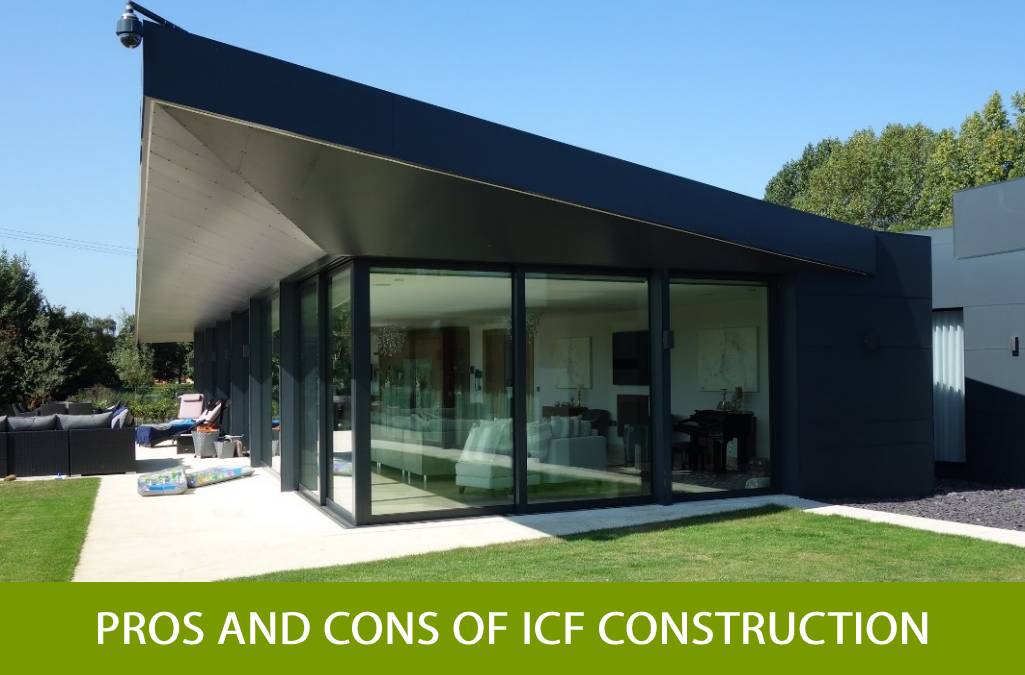
The Pros and Cons of ICF Construction in the UK
Insulated Concrete Formwork (ICF) is a modern construction method that is growing in popularity and becoming more prominent within the international housing market on a daily basis. The high quality of the buildings as well as the lengthy benefits associated with ICF have made the general public become more familiar with this noteworthy building technique. When compared to more traditional building techniques, ICF stands out for its superior quality and comfort. Naturally there are disadvantages, and these, along with the advantages, will be outlined below.
Pros
Speed of build
The ICF construction method is simple and not labour intensive. ICF blocks are made of extremely lightweight expanded polystyrene (EPS) and are hollow in the middle. The blocks are designed with a grid that interlocks and allows for easy stacking, very similar to ‘Lego’ blocks. This cuts out a huge portion of construction time compared to a traditional building style as they can be assembled very quickly. Following this, concrete is applied into the hollow blocks using a concrete pump, giving the building all the security of traditional concrete blocks in half the time. Furthermore, ICF construction is not weather dependent and so is unaffected by adverse conditions such as rain. This allows your project to proceed on schedule, with no setbacks.
Airtightness
One of the main advantages of ICF’s construction method is the level of airtightness that it guarantees. Insulation is continuous throughout an ICF building, meaning there is no opportunity for the home to be penetrated by outside air. This ensures the building will be free from drafts and so allows the temperature to be controlled constantly. This also prevents the mixture of cool and warm air, called cold-bridging, which is a major cause of condensation and mould. ICF houses should incorporate a mechanical ventilation system to supply the home with fresh air 24/7.

Reduction in Energy Bills
Being incredibly energy efficient, ICF homes can easily achieve an ‘A’ rating. This level of efficiency means less energy is required to heat the home and thus reduces the energy bill.
Owners of ICF buildings have experienced as much as a 60% reduction in their energy bills as a result of the system. ICF also saves money during the building process due to the reduced manpower required for the simple building system.
Durability
ICF buildings are incredibly structurally sound due to the concrete and steel reinforcement that is incorporated in the walls. ICF buildings are considered ‘disaster-proof’, and have withstood the most adverse conditions, including hurricanes. Many ICF buildings come with a 60+ year guarantee and do not deteriorate at the rate of a traditional build. This durability ensures that ICF buildings maintain their quality and character throughout the duration of their lifespan, giving the owner great security and reassurance.

Peace and Quiet
Noise levels are increasing on a regular basis. There are a number of factors which could be blamed – dense populations, more vehicles on roads, busier nightlife etc., but realistically it is unavoidable. If noise is an issue in your area, or if you would like to live in a city but still have a peaceful home environment, ICF may offer a solution.
While more traditional construction methods consider sound proofing an afterthought, it comes naturally with ICF. The ICF blocks used in construction create incredibly thick and solid walls, which noise simply cannot penetrate .
Once the structure is in place, sound proofing is guaranteed. This is a major benefit as it cuts out the very expensive cost of sound proofing a traditional concrete home, by providing the service naturally. It ensures a peaceful home, undisturbed by unwanted noise from busy roads or cities.
A Healthier Home & Environment
ICF construction is one of the most efficient ways of guaranteeing a rodent-free building. This is due to the thick barricade of concrete which seals the building and ensures no insects can enter, which is further enhanced by the fact that there is no organic matter in the building material, meaning nothing for the nsects to feed on.
ICF can also guarantee a mould-free building, thanks to the incorporation of a mechanical ventilation system which prevents cold bridging, thus eradicating condensation. The air in the building is constantly filtered and there is a constant 24/7 stream of fresh air. This helps to create a healthier environment in the building and protects the air within the home from pollutants and other external factors.
ICF construction is also incredibly environmentally friendly as there is minimal waste involved in ICF construction and the majority of ICF materials are recyclable.
Less Maintenance
In a traditional build-style home, maintenance is usually considered a necessity, or an unavoidable cost. With ICF, very little to no maintenance is required to maintain the home. The structural stability of an ICF home means all future problems are prevented and the home maintains its original condition naturally throughout its lifespan. The other benefits of ICF combine, to ensure very little maintenance costs. The airtightness which prevents condensation and mould ensures that structural damage is avoided and there is no unsightly damage to the walls. The concrete frame also ensures the building does not disintegrate, but maintains its structure throughout its lifespan.

Flexible Design
One of the most important aspects of building a home is the design, as it is the most personal to the homeowner. When building a home, a priority for most is ensuring the design is exactly what they had envisioned. Luckily, ICF does not require the sacrifice of your dream home, as it does not limit the architect’s designs.
ICF can cater to the most traditional of styles, and has even been used on farmhouses, to the most modern, contemporary designs with intricate details.
Furthermore, ICF is suitable for all types of finishes including stone, brick and steel.
Easy to build
The building process of ICF is incredibly simple and thus reduces labour requirements for the project. The EPS block are incredibly light, with a waffle-grid making them easily stackable – almost like ‘Lego’. The concrete is added using a pump following this stacking, making the process very simple and quick. The build time and the number of workers are both reduced as a result of this simplicity.
Cons
Of course, the ICF building system is not flawless. An issue that can arise with ICF is that the walls can be very thick. While this can be beneficial in some situations, in compact areas with limited space, this can be an issue. Particularly in cities, where building space is limited bulky blocks can inhibit ICF building.
